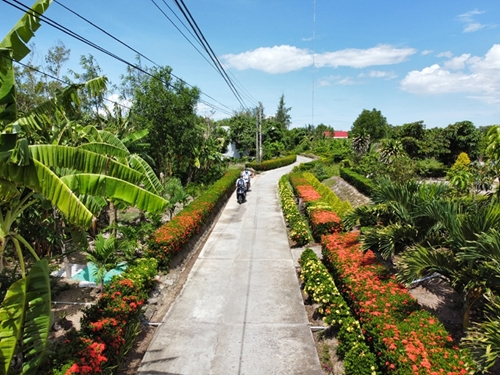In Binh Tot A hamlet, Vinh Phu Tay commune, Phuoc Long district, Bac Lieu province, Cao Thi Ut used to visit the commune's People’s Committee for administrative procedures. However, for over a year now, she has been using a specialized mobile application for these tasks. "Initially, it was a bit unfamiliar, but with guidance from the local digital technology team, I quickly became proficient. Now, exchanging information is much more convenient and faster," she shared.
    |
 |
|
The new-style rural Ninh Quoi commune in Hong Dan district, Bac Lieu province |
Binh Tot A was selected in alignment with Bac Lieu province's smart new-style rural criteria for the 2021-2025 period, requiring at least one smart hamlet in each commune. According to Nguyen Hong Lanh, Secretary of the Vinh Phu Tay commune's Party Committee, the local authorities have established public digital technology teams of the commune and Binh Tot A hamlet to instruct residents to use smart devices and software.
The smart hamlet model is equipped with solar-powered LED lighting, remote-controlled irrigation systems, high-speed public Wi-Fi, and origin-tracking label printers for production management. These investments have enhanced economic efficiency and facilitated communication for residents, businesses, and officials.
Similarly, Phong Thanh A commune in Gia Rai town, Bac Lieu province, has modernized its administrative procedures to better serve its residents and businesses. Initially, many residents struggled due to the lack of smartphones or not clearly understanding about online procedures. However, through digital transformation campaigns, most residents now own smartphones and level-2 identification accounts, enabling them to submit applications online. “Now, they can submit documents from home and schedule appointments to collect results or even have them delivered,” said Bui Thi Thuy, a judicial staff in Phong Thanh A commune.
Enhancing income has been a crucial criterion for building new-style rural areas. Therefore, the province has promoted value chain production and expanded modern agricultural practices, such as waste-free shrimp farming and integrated aquaculture-forestry models. Local specialties have been processed, packaged, and sold on e-commerce platforms, creating new income flows for rural households.
Furthermore, Ca Mau's agricultural sector has established cooperatives focusing on aquaculture and seafood processing. These cooperatives provide jobs for locals and increase their incomes. Many cooperatives have introduced branded, high-quality products, including those that have achieved 3-star or 4-star OCOP certifications, and are recognized in domestic and international markets.
The achievements in building new-style rural areas in Bac Lieu and Ca Mau provinces have resulted from the unity and collaboration between local authorities and residents. These successes serve as a strong foundation for continued rural development, focusing on improving living standards, sustainable infrastructure, and public satisfaction. Achieving these goals requires concrete actions, leveraging local resources, and fostering community consensus.
Translated by Trung Thanh